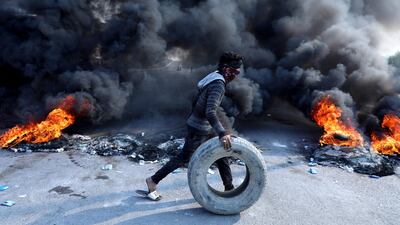While protests in Iraq continue to rage and people demand an end to Tehran’s influence over the country, a feeling of solidarity with Iranians has developed.
Demonstrations broke out in Iraq in October over corruption, a lack of jobs and Iran’s involvement in the country’s politics.
More than 300 people were killed in the crackdown that followed, and although services have now returned, Iraqis faced wide internet cuts earlier in the protests.
On November 15, Iranians also took to the streets, angered by a 50 per cent increase in fuel prices.
The protests quickly developed into a wider call to end corruption and inequality in the country, which was also met with an iron fist.
More than 140 were killed, Amnesty International said, and there were as many as 7,000 arrests.
Both countries have been accused of trying to cover up the extent of the damage.
Human Rights Watch on Wednesday accused the Iranian authorities of deliberately covering up deaths and arrests.
The government's shutdown of the internet brought a communications cut to much of the country to try to stop details of the protests, and crackdown, being shared online.
Yet despite the Iranian government being the key enemy of Iraqi protesters, they say they feel accord for the ordinary people and see themselves in their struggle.
“In our protests, when we say 'Iran out', it’s not about Iranian people, it’s about Iranian influence – the biggest influence on the destruction of the Iraqi government and country,” said Ridha Shakir, 23, a medic protesting in Baghdad's Tahrir Square.
“They [Tehran] support illegal forces with weapons and money.”
Iranian protesters face the same class of corrupt politicians as Iraqis and their efforts at resistance are met with the same type of violence, Mr Shakir said.
“The protesters in Iran face the same problems as us," he said. "Their forces, their army are not there to save the country or the people, they’re just there to save the authorities.
"The people understand this problem and don’t want religion to control them."
Another protester, "Mariam", said: “You’d think they [Iraq and Iran] would do things a little differently so that it would look like there was a difference.
"Any child who sees this would think, ‘This is the same as that’.”
To protesters such as Mariam, the similar responses suggest the Iraqi government worked with the Iranians to suppress dissent.
“There is nothing hidden, it’s all clear," she said. "The suppression in Iraq is the same as that in Iran.
"It's the same politics, the same methods, the same team. The plan there is the same as the plan here, which means it’s the same politicians.
“We want the Iranian people to live well and in peace because they are very oppressed.
"Our problem is with the Iranian government, not the Iranian people. Their situation is our situation.
“In 2011, there were protests in Tunis, then in Egypt, then in another place," Mariam said. "These protests give people bravery and motivation.
"You won’t be able to go out and say 'This is what I want' if you don’t have two or three people behind you, and that makes five more go out, and so forth.
“This is how people work. When people see others go to demand their rights, they also go out, Lebanon went out, Algeria went out, Iraq went out and now Iran went out.”
She believed that the Iraqi and Iranian protesters gave motivation to each other to continue demonstrating, despite the continuous threats of kidnapping, arrest and violence.
“The Iraqi protests made the Iranians brave enough to go out uprise against their corrupt government, and at the same time, it gives us the bravery to continue protesting more and more," Mariam said.
"It gives us a completely strong motivation to know the Iranian people are rising up with us."












